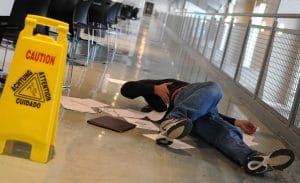When Is a Business Owner Liable for a Slip and Fall Injury?
 Whether you own a small business or a large company, you should consider your risk of liability if someone happens to get hurt while on your property. One of the primary causes of injury that a business can be liable for is a slip and fall accident. After all, there is a lot of room for negligence to render the premises unsafe. Today, we will discuss some of the situations that can give rise to a personal injury claim when you get hurt while visiting a business.
Whether you own a small business or a large company, you should consider your risk of liability if someone happens to get hurt while on your property. One of the primary causes of injury that a business can be liable for is a slip and fall accident. After all, there is a lot of room for negligence to render the premises unsafe. Today, we will discuss some of the situations that can give rise to a personal injury claim when you get hurt while visiting a business.
What does it mean for a business to be “negligent”?
If you are injured on the property of a business, you will need to show that the cause of your injury was rooted in the property owner’s/operator’s negligence. The owner of the property owes a duty of care to visitors to make the premises safe. If the owner fails in that duty, then the owner may be found negligent.
For example, say the owner of an apartment building knows there is a loose step inside the building. The owner neither fixes the step, nor issues any warning about the step to residents or guests. You trip and fall on the step. The owner can be found negligent for neither fixing the step, nor warning the residents or guests about its dangers.
Negligence must lead to your injuries
In order to be successful in your claim, you must prove that the property owner’s negligence is what led to your injuries. In the example above, if your trip and fall led to a broken leg, then you can claim that the owner’s negligence is what caused you to fall and be injured.
However, simply sustaining an injury is not enough to claim negligence. For example, say you climb a shelf to reach a product in a store. If the shelf breaks under the pressure and canned goods fall, hitting you in the head, your chance of recovering for your injuries is slim because the cans would not have hit you if you had not climbed on the shelf.
Other examples where owners may not be held negligent include:
- You entered a dangerous area clearly marked with warning signs
- You accessed a restricted area
- You were trespassing on a property
On the other hand, if you reach up to grab a can off a top shelf and the way they were stacked caused several to tumble down and hit you, the business could be found liable. A business can be at fault for injuries that occur both inside or outside the building, such as:
- Failing to maintain parking lots that contain potholes
- Neglecting to have snow and ice removed from sidewalks or walkways
- Failure to repair loose steps or railings
- Not removing debris from the ground after a storm that creates a tripping hazard
You could be entitled to compensation for your losses
If an owner is found negligent, and that negligence caused you harm, you could be entitled to damages: a monetary award that compensates you for your losses. Under the law, you can seek compensation for:
- Past and future medical bills
- Past and future lost wages
- Pain and suffering
- Disability or disfigurement
- Emotional distress
- Property damage
You only have three years to file your slip and fall claim in North Carolina. If you fail to file suit or otherwise resolve your claim within the three years statute of limitation, you forfeit all rights to recover for your injuries.
The experienced Charlotte slip and fall attorneys at Warren & Kallianos, PLLC do not want to see you lose out on recovering the full damages that may be rightfully owed to you. To learn about your legal options after suffering from a slip and fall injury, schedule your free by calling 704-377-7777, or by filling out our contact page.

At Warren & Kallianos, we believe in the importance of working directly with our attorneys, Jeff Warren and Chris Kallianos. When you work with our firm, Jeff and Chris are always accessible to you throughout the progress of your case.
Read more about Warren & Kallianos, PLLC
